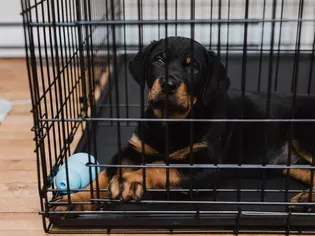How to House Train Your New Puppy
Updated on 04/26/24

Unlock the Secrets to a Clean and Happy Home: The Ultimate Guide to House Training Your New Puppy
Bringing home a new puppy is an exciting moment, but it also comes with a daunting task: house training. To ensure a harmonious coexistence between you and your precious fur baby, it's crucial to establish clear boundaries and teach them where it's appropriate to relieve themselves. This comprehensive guide will equip you with all the essential knowledge and proven techniques to transform your puppy into a potty-trained pro in no time.
1. Establish a Regular Schedule
Consistency is key when house training your puppy. Designate specific times throughout the day when you will take them outside to do their business, such as after waking up, after meals, and before bedtime. By sticking to a regular schedule, your puppy will learn to anticipate their bathroom breaks and hold it until they're in the designated area.
2. Choose a Potty Spot
Select a specific spot in your yard or nearby area where you want your puppy to go potty. Consistency in location will help them develop a strong association between the spot and the act of elimination.
3. Supervise and Praise
During the initial training phase, keep a close eye on your puppy. When they show signs of needing to go, such as circling, sniffing, or squatting, immediately take them to their potty spot. Once they relieve themselves in the designated area, shower them with praise and treats. Positive reinforcement will motivate them to repeat the desired behavior.
4. Crate Training
Crate training can be an effective tool in house training. Puppies instinctively avoid soiling their sleeping area, so confining them to a crate when not supervised can help prevent accidents. Gradually increase the time your puppy spends in the crate until they can hold it for several hours.
5. Accident Management
Accidents are inevitable during the training process. If your puppy goes potty in an inappropriate area, do not punish them. Instead, calmly clean up the mess and redirect them to their potty spot. Never rub their nose in it or use harsh words, as this will only damage their trust and make them fearful of pottying in front of you.
6. Patience and Consistency
House training requires patience and consistency. It may take several weeks or even months for your puppy to fully grasp the concept. Stay positive and avoid setbacks by sticking to the training schedule and providing plenty of praise and treats.
7. Common Training Errors
* Letting your puppy roam freely: This can make it difficult to monitor their behavior and catch them in the act.
* Not taking them outside frequently enough: Puppies have small bladders and need frequent opportunities to relieve themselves. Aim for at least every two hours, especially after meals and naps.
* Ignoring early signs of needing to go: Pay attention to your puppy's body language and take them outside immediately if they show any signs of needing to eliminate.
* Using punishment: Punishment can damage your bond with your puppy and make them fearful of going potty in front of you.
* Giving up too early: House training can be challenging, but it's important to stay patient and consistent. With time and effort, your puppy will eventually learn the desired behavior.
Additional Tips
* Use a cue word: Create a verbal cue, such as "go potty," when taking your puppy to their designated spot. This will help them associate the word with the act of elimination.
* Limit water intake before bedtime: To minimize the risk of accidents during the night, restrict your puppy's water intake a few hours before bedtime.
* Use puppy pads as a temporary solution: If you cannot take your puppy outside frequently, puppy pads can be used as a temporary solution in indoor areas. However, it's important to gradually transition them to going potty outside as soon as possible.
* Seek professional help: If you encounter significant difficulties in house training your puppy, don't hesitate to seek professional help from a veterinarian or certified dog trainer. They can assess the situation and provide tailored guidance.
Remember, house training is a journey, not a destination. With patience, consistency, and positive reinforcement, you and your furry companion will achieve a harmonious and accident-free household. Embrace the experience, and cherish the growing bond you'll share as you guide your puppy towards potty-training success.
Explore More Pets

Basic Training
Puppy and Baby Introductions

Working Dog Breeds
All About Search and Rescue Dogs

Dog Treatments
Puppy Vaginitis: Signs, Causes and Treatment

Dog Adoption
After More Than 1,200 Days in the Shelter, Coco Goes Home

Basic Training
How to Train Your Puppy to Go on Potty Pads

Hybrid Dog Breeds
The Difference Between a Mutt, Mixed Breed, or Designer Dog?

Dog Treatments
Nail Problems in Dogs

Puppies
7 Reasons Why Two Dogs Are Better Than One